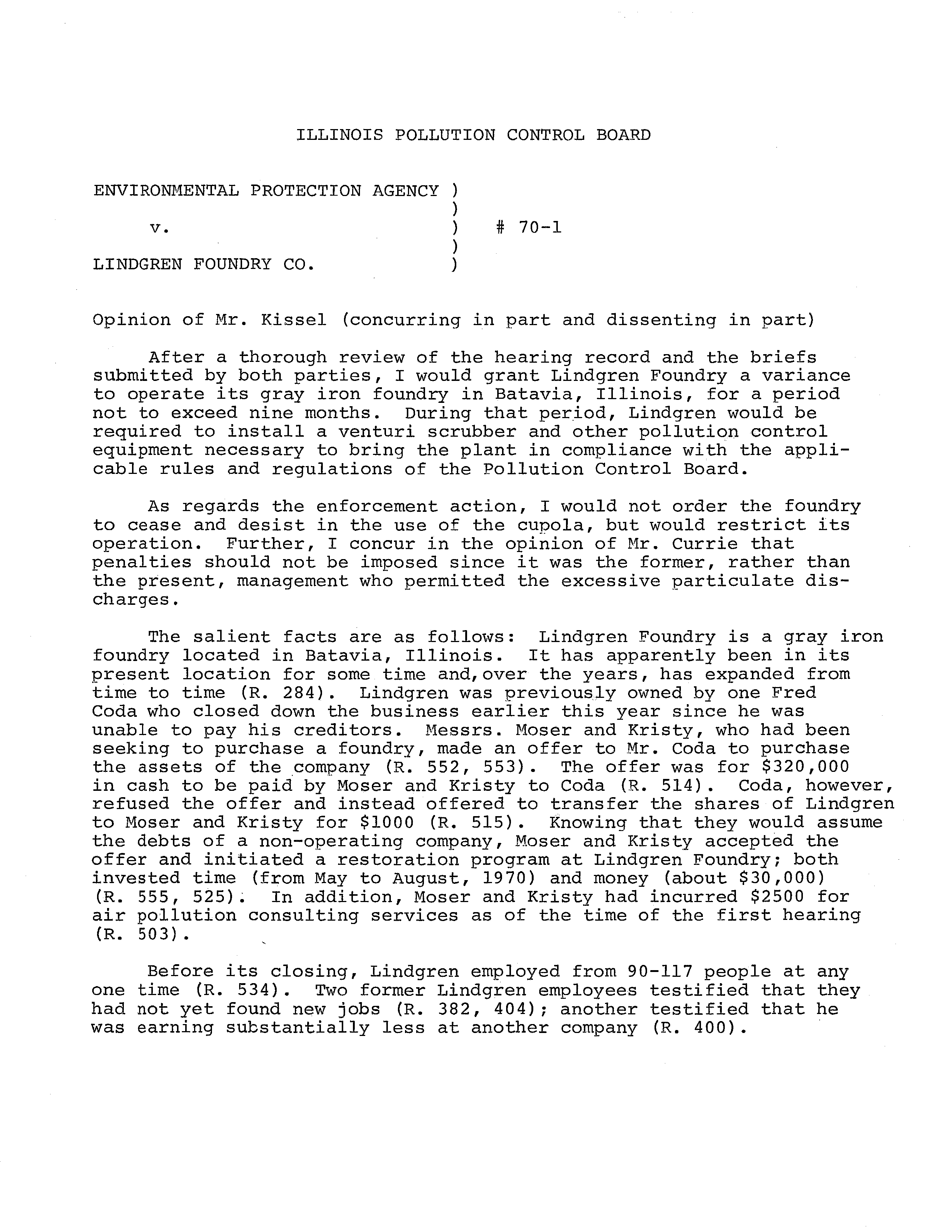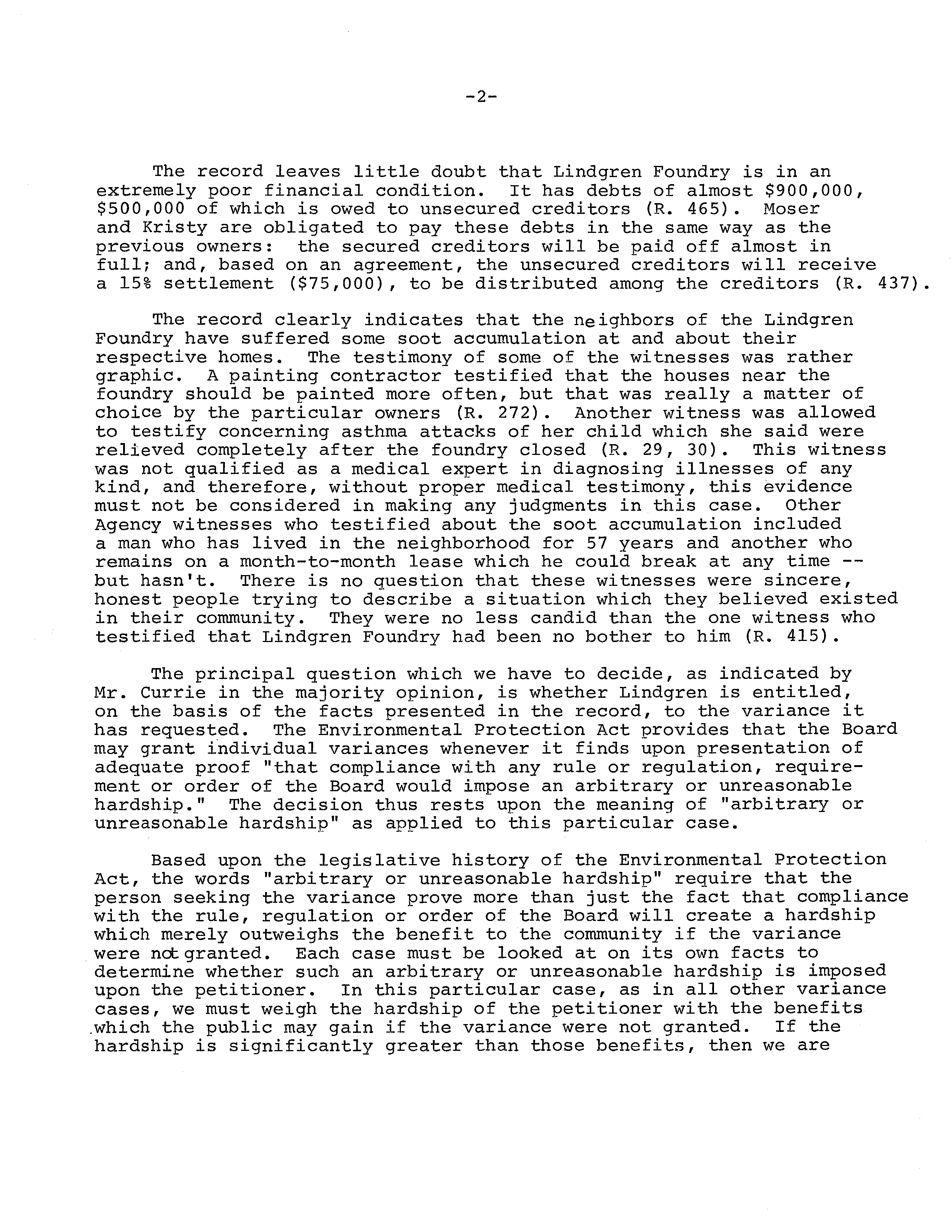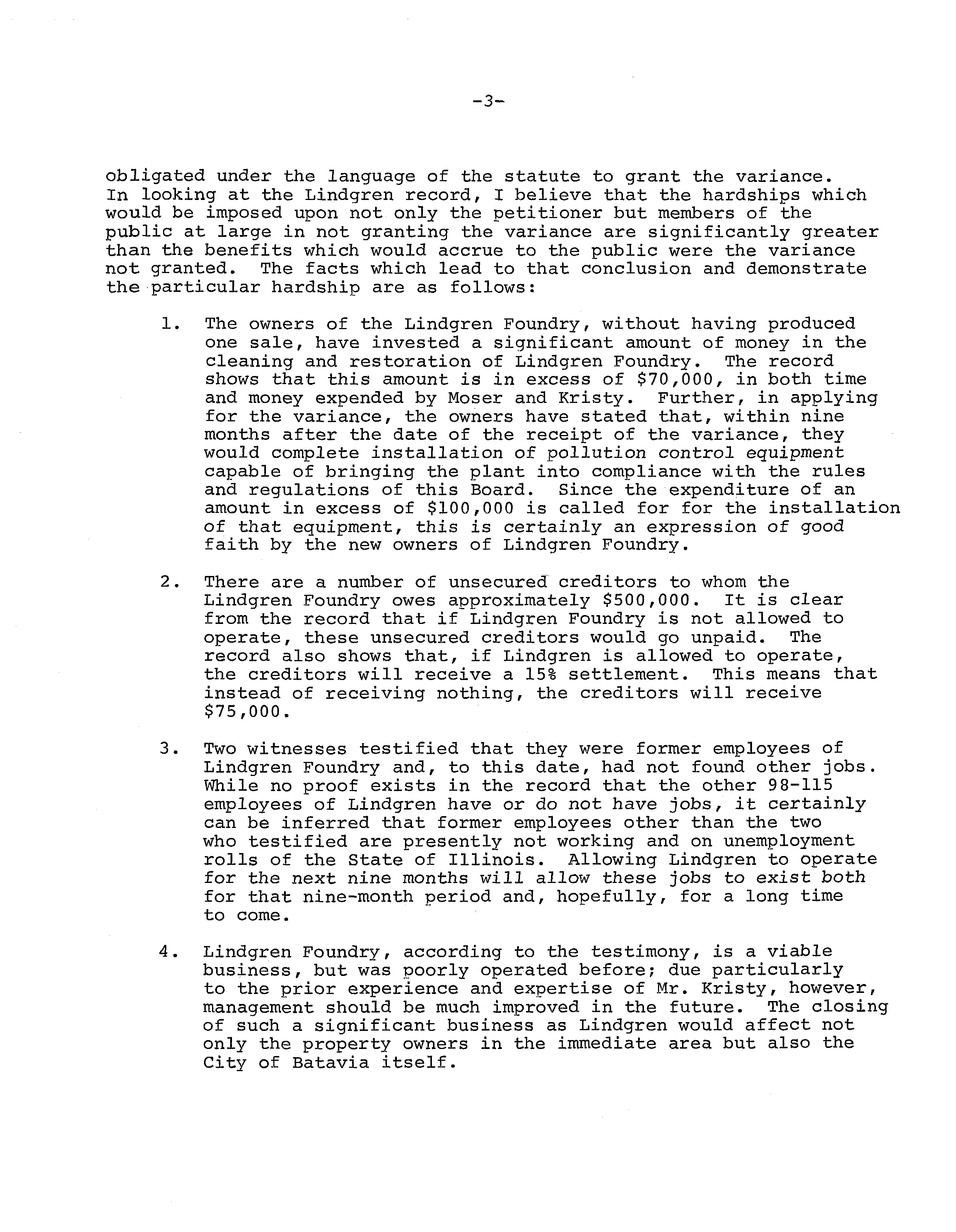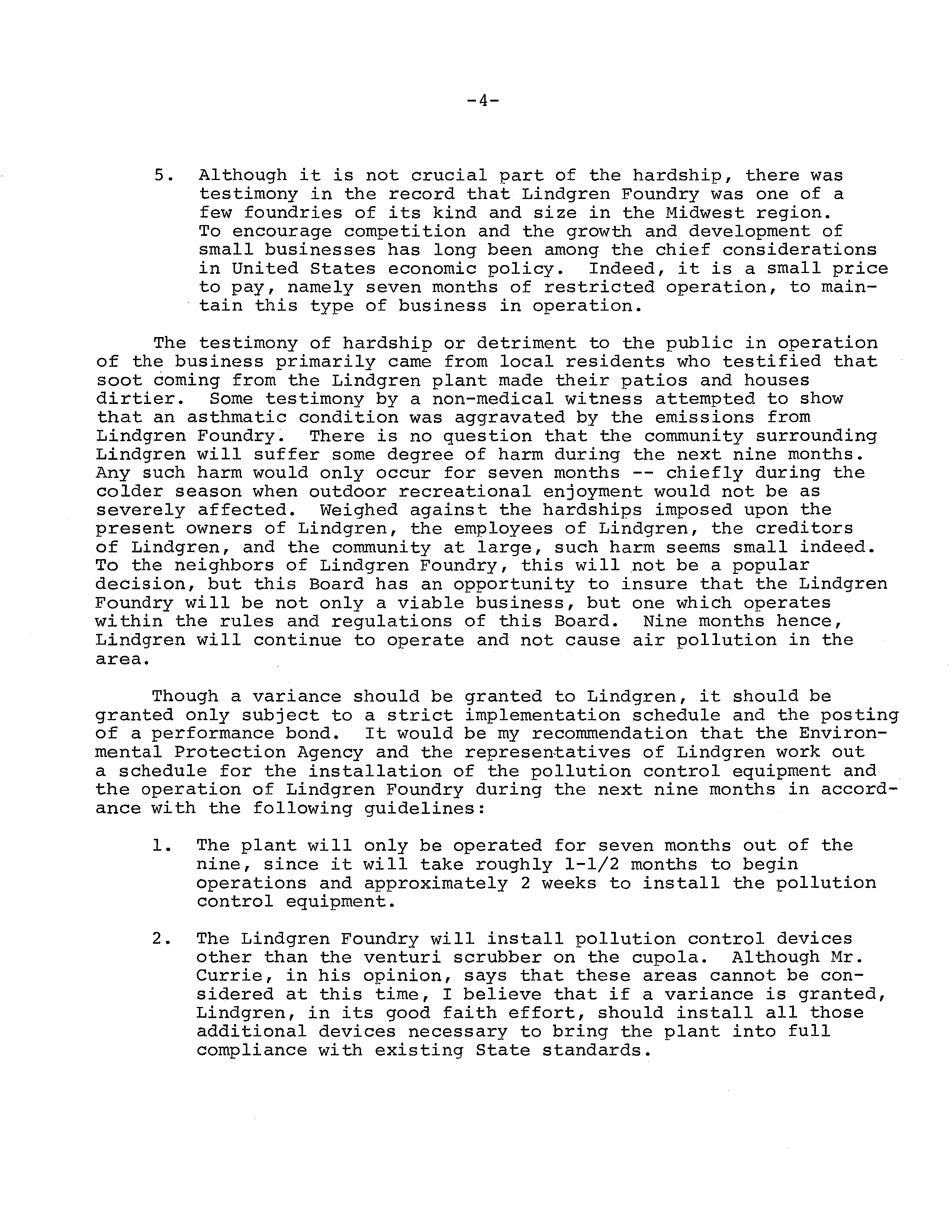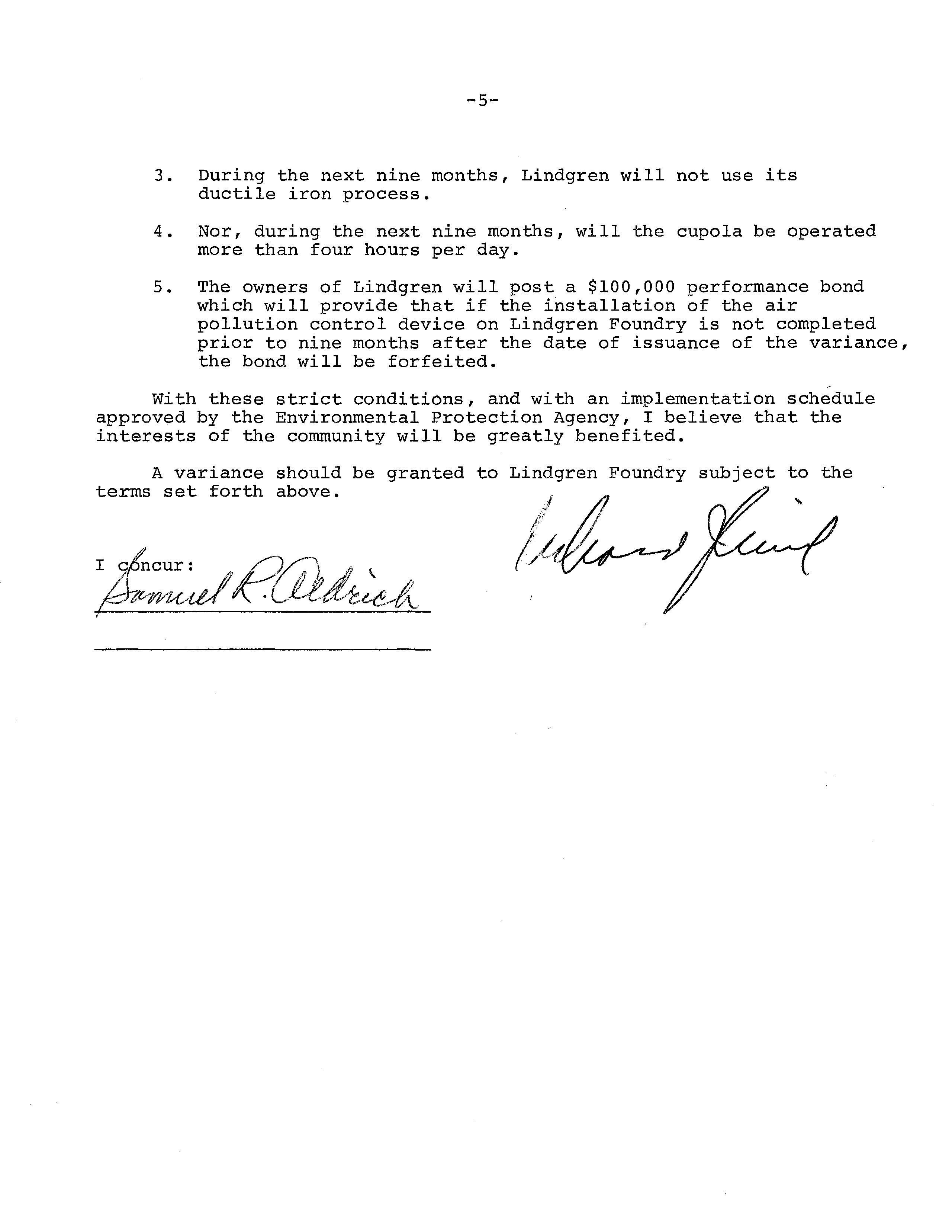ILLINOIS POLLUTION CONTROL BOARD
ENVIRONMENTAL PROTECTION AGENCY
)
v.
)
#
70—i
LINDGREN FOUNDRY CO.
)
Opinion of Mr.
Kissel
(concurring in part and dissenting in part)
After a thorough review of the hearing record and the briefs
submitted by both parties,
I would grant Lindgren Foundry a variance
to operate its gray iron foundry in Batavia, Illinois, for a period
not to exceed nine months.
During that period, Lindgren would be
required to install
a venturi scrubber and other pollution control
equipment necessary to bring the plant in compliance with the appli-
cable
rules and regulations of the Pollution Control Board.
As regards the enforcement action,
I would not order the foundry
to cease and desist in the use of the cupola, but would restrict its
operation.
Further,
I concur in the opinion of Mr. Currie that
penalties
should not be imposed since it was the former,
rather than
the present, management who permitted the excessive particulate dis-
charges.
The salient facts are as follows:
Lindgren Foundry is
a gray iron
foundry located in Batavia,
Illinois.
It has apparently been in its
present location for some time and, over the years, has expanded from
time to time
(R.
284).
Lindgren was previously owned by one Fred
Coda who closed down the business earlier this year since he was
unable to pay his creditors.
Messrs. Moser and Kristy, who had been
seeking to purchase a foundry, made an offer to Mr. Coda to purchase
the assets of the company
CR.
552, 553).
The offer was for $320,000
in cash to be paid by Moser and Kristy to Coda
CR.
514).
Coda, however,
refused the offer and instead offered to transfer the shares of Lindgren
to Moser and Kristy for $1000
CR.
515).
Knowing that they would assume
the debts of a non—operating company, Moser and Kristy accepted the
offer and initiated a restoration program at Lindgren Foundry; both
invested time
(from May to August,
1970)
and money
(about $30,000)
CR.
555, 525).
In addition, Moser and Kristy had incurred $2500 for
air pollution consulting services
as of the time of the first hearing
CR.
503)
.
Before its closing, Lindgren employed from 90-117 people at any
one time
CR.
534).
Two former Lindgren employees testified that they
had not yet found new jobs
(R.
382,
404); another testified that he
was earning substantially less at another company
CR.
400).
—2—
The record leaves little doubt that Lindgren Foundry is in an
extremely poor financial condition.
It has debts of almost $900,000,
$500,000 of which is owed to unsecured creditors
CR.
465).
Moser
and Kristy are obligated to pay these debts in the same way as the
previous owners:
the secured creditors will be paid off almost in
full; and, based on an agreement, the unsecured creditors will receive
a 15
settlement
($75,000), to be distributed among the creditors
CR.
437).
The record clearly indicates that the neighbors of the Lindgren
Foundry have suffered some soot accumulation at and about their
respective homes.
The testimony of some of the witnesses was rather
graphic.
A painting contractor testified that the houses near the
foundry should be painted more often, but that was really a matter of
choice by the particular owners
CR.
272).
Another witness was allowed
to testify concerning asthma attacks of her child which she said were
relieved completely after the foundry closed
CR.
29,
30).
This witness
was not qualified as
a medical expert in diagnosing illnesses of any
kind, and therefore, without proper medical testimony,
this evidence
must not be considered in making any judgments in this case.
Other
Agency witnesses who testified about the soot accumulation included
a man who has lived in the neighborhood for 57 years and another who
remains on a month—to-month lease which he could break at any time
—-
but hasn’t.
There is no question that these witnesses were sincere,
honest people trying to describe a situation which they believed existed
in their community.
They were no less candid than the one witness who
testified that Lindgren Foundry had been no bother to him
CR.
415).
The principal question which we have to decide,
as indicated by
Mr. Currie in the majority opinion,
is whether Lindgren is entitled,
on the basis of the facts presented in the record,
to the variance it
has requested.
The Environmental Protection Act provides that the Board
may grant individual variances whenever it finds upon presentation of
adequate proof “that compliance with any rule or regulation, require-
ment or order of the Board would impose an arbitrary or unreasonable
hardship.”
The decision thus rests upon the meaning of “arbitrary or
unreasonable hardship”
as applied to this particular case.
Based upon the legislative history of the Environmental Protection
Act, the words “arbitrary or unreasonable hardship” require that the
person seeking the variance prove more than just the fact that compliance
with the rule, regulation or order of the Board will create a hardship
which merely outweighs the benefit to the community if the variance
were nob granted.
Each case must be looked at on its own facts to
determine whether such an arbitrary or unreasonable hardship is imposed
upon the petitioner.
In this particular case,
as in all other variance
cases, we must weigh the hardship of the petitioner with the benefits
.which the public may gain if the variance were not granted.
If the
hardship is significantly greater than those benefits, then we are
—3—
obligated under the language of the statute to grant the variance.
In looking at the Lindgren record,
I believe that the hardships which
would be imposed upon not only the petitioner but members of the
public at large in not granting the variance are significantly greater
than the benefits which would accrue to the public were the variance
not granted.
The facts which lead to that conclusion and demonstrate
the particular hardship are as follows:
1.
The owners of the Lindgren Foundry, without having produced
one sale, have invested a significant amount of money in the
cleaning and restoration of Lindgren Foundry.
The record
shows that this amount
is
in excess of $70,000, in both time
and money expended by Moser and Kristy.
Further, in applying
for the variance, the owners have stated that, within nine
months after the date of the receipt of the variance, they
would complete installation of pollution control
equipment
capable of bringing the plant into compliance with the rules
and regulations
of this Board.
Since the expenditure of an
amount in excess of $100,000
is called for for the installation
of that equipment,
this is certainly an expression of good
faith by the new owners of Lindgren Foundry.
2.
There are a number of unsecured creditors to whom the
Lindgren Foundry owes approximately $500,000.
It is clear
from the record that if Lindgren Foundry is not allowed to
operate, these unsecured creditors would go unpaid.
The
record also shows that,
if Lindgren is allowed to operate,
the creditors will receive a 15
settlement.
This means that
instead of receiving nothing,
the creditors will receive
$75 ,000.
3.
Two witnesses testified that they were former employees of
Lindgren Foundry and, to this date, had not found other jobs.
While no proof exists in the record that the other 98-115
employees of Lindgren have or do not have jobs, it certainly
can be inferred that former employees other than the two
who testified are presently not working and on unemployment
rolls of the State of Illinois.
Allowing Lindgren to operate
for the next nine months will allow these
jobs to exist both
for that nine-month period and, hopefully,
for a long time
to come.
4.
Lindgren Foundry, according to the testimony,
is
a viable
business, but was poorly operated before; due particularly
to the prior experience and expertise of Mr.
Kristy, however,
management should be much improved in the future.
The closing
of such a significant business as Lindgren would affect not
only the property owners in the immediate area but also the
City of Batavia itself.
—4—
5.
Although it is not crucial part of the hardship, there was
testimony in the record that Lindgren Foundry was one of
a
few foundries of its kind and size in the Midwest region.
To encourage competition and the growth and development of
small businesses has long been among the chief considerations
in United States economic policy.
Indeed,
it is
a small price
to pay, namely seven months of restricted operation,
to main-
tain this type of business in operation.
The testimony of hardship or detriment to the public in operation
of the business primarily came from local residents who testified that
soot coming from the Lindgren plant made their patios and houses
dirtier.
Some testimony by a non-medical witness attempted to show
that an asthmatic condition was aggravated by the emissions from
Lindgren Foundry.
There is no question that the community surrounding
Lindgren will suffer some degree of harm during the next nine months.
Any such harm would only occur for seven months
--
chiefly during the
colder season when outdoor recreational enjoyment would not be as
severely affected.
Weighed against the hardships imposed upon the
present owners of Lindgren, the employees of Lindgren, the creditors
of Lindgren, and the community at large, such harm seems small indeed.
To the neighbors of Lindgren Foundry, this will not be a popular
decision, but this Board has an opportunity to insure that the Lindgren
Foundry will be not only a viable business, but one which operates
within the rules and regulations of this Board.
Nine months hence,
Lindgren will continue to operate and not cause air pollution in the
area.
Though a variance should be granted to Lindgren,
it should be
granted only subject to a strict implementation schedule and the posting
of a performance bond.
It would be my recommendation that the Environ-
mental Protection Agency and the representatives of Lindgren work out
a schedule for the installation of the pollution control equipment and
the operation of Lindgren Foundry during the next nine months in accord-
ance with the following guidelines:
1.
The plant will only be operated for seven months out of the
nine,
since it will take roughly 1-1/2 months
to begin
operations and approximately
2 weeks to install the pollution
control equipment.
2.
The Lindgren Foundry will install pollution control devices
other than the venturi scrubber on the cupola.
Although Mr.
Currie, in his opinion, says that these areas cannot be con-
sidered at this time,
I believe that if a variance is granted,
Lindgren, in its good faith effort, should install all those
additional devices necessary to bring the plant into full
compliance with existing State standards.
—5—
3.
During the next nine months,
Lindgren will not use its
ductile iron process.
4.
Nor, during the next nine months, will the cupola be operated
more than four hours per day.
5.
The owners of Lindgren will post a $100,000 performance bond
which will provide that if the installation of the air
pollution control device on Lindgren Foundry is not completed
prior to nine months after the date of issuance of the variance,
the bond will be forfeited.
With these strict conditions, and with an implementation schedule
approved by the Environmental Protection Agency,
I believe that the
interests of the community will be greatly benefited.
A variance should be granted to Lindgren Foundry subject to the
terms set forth above
